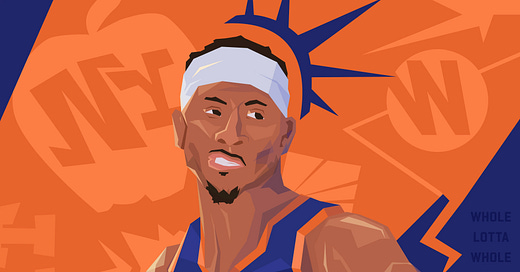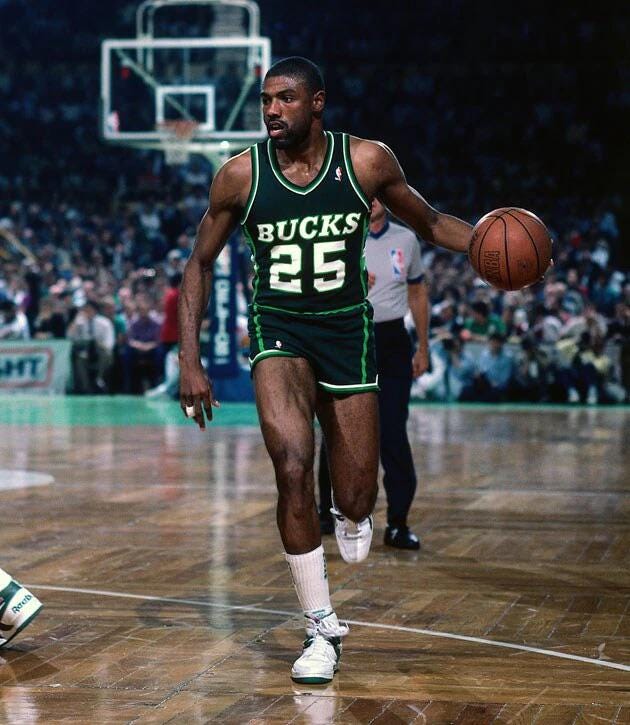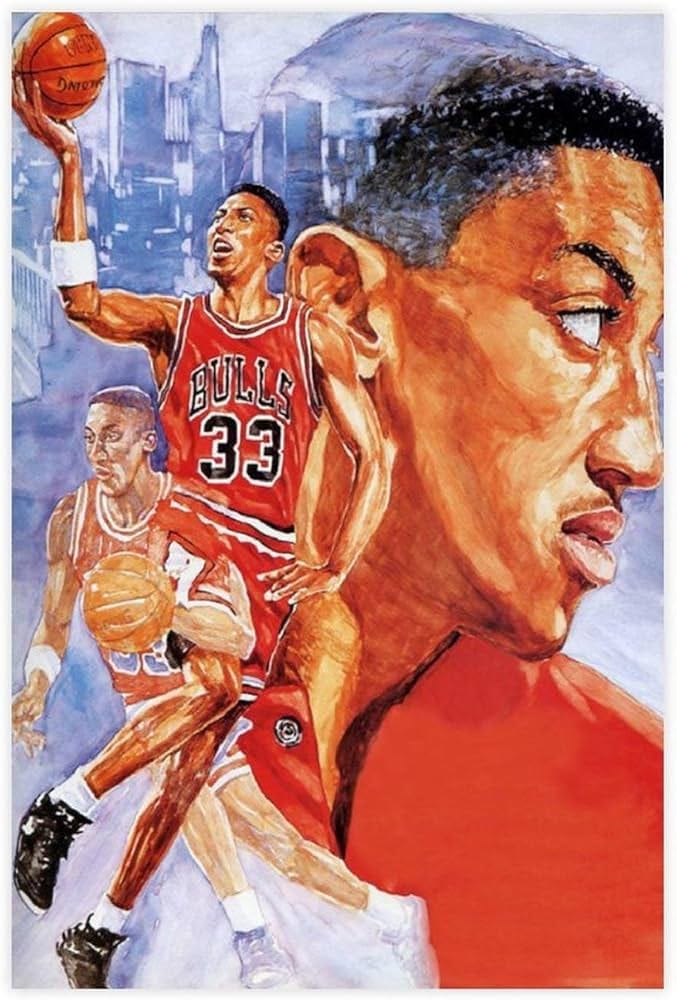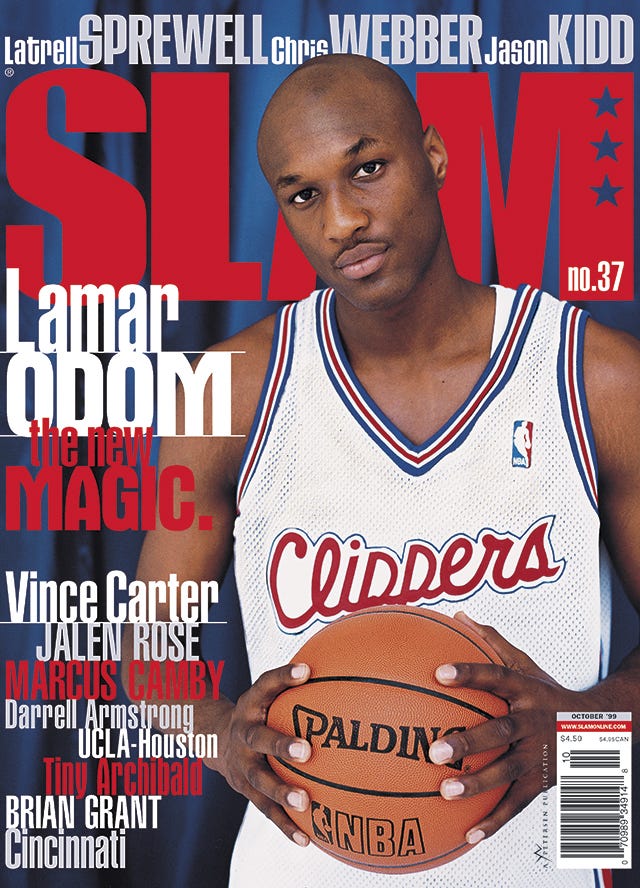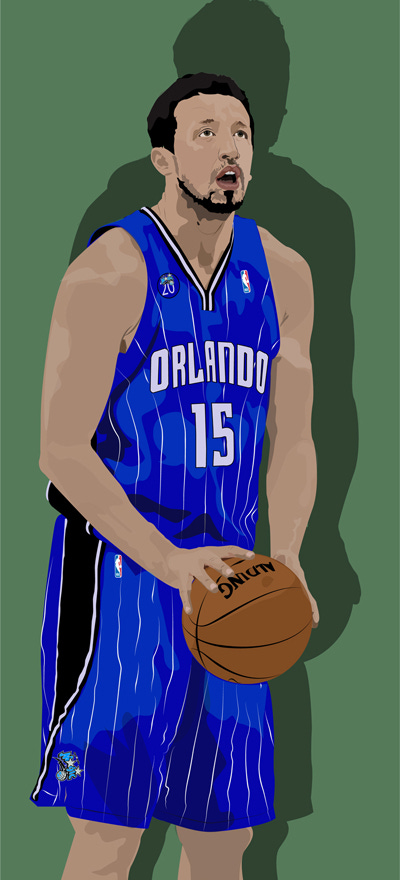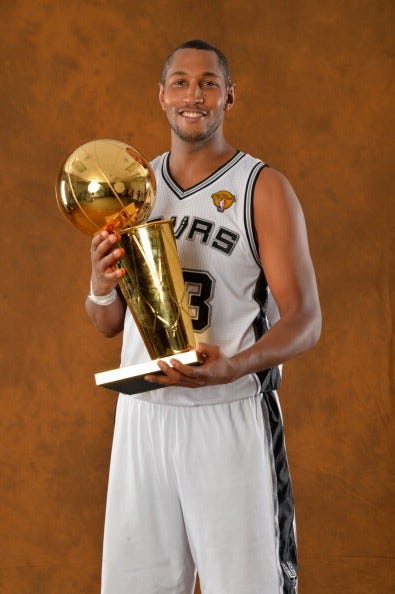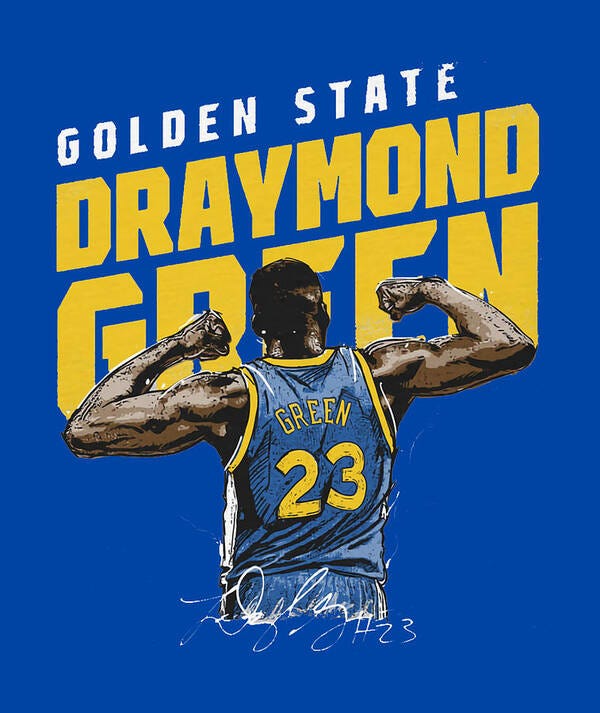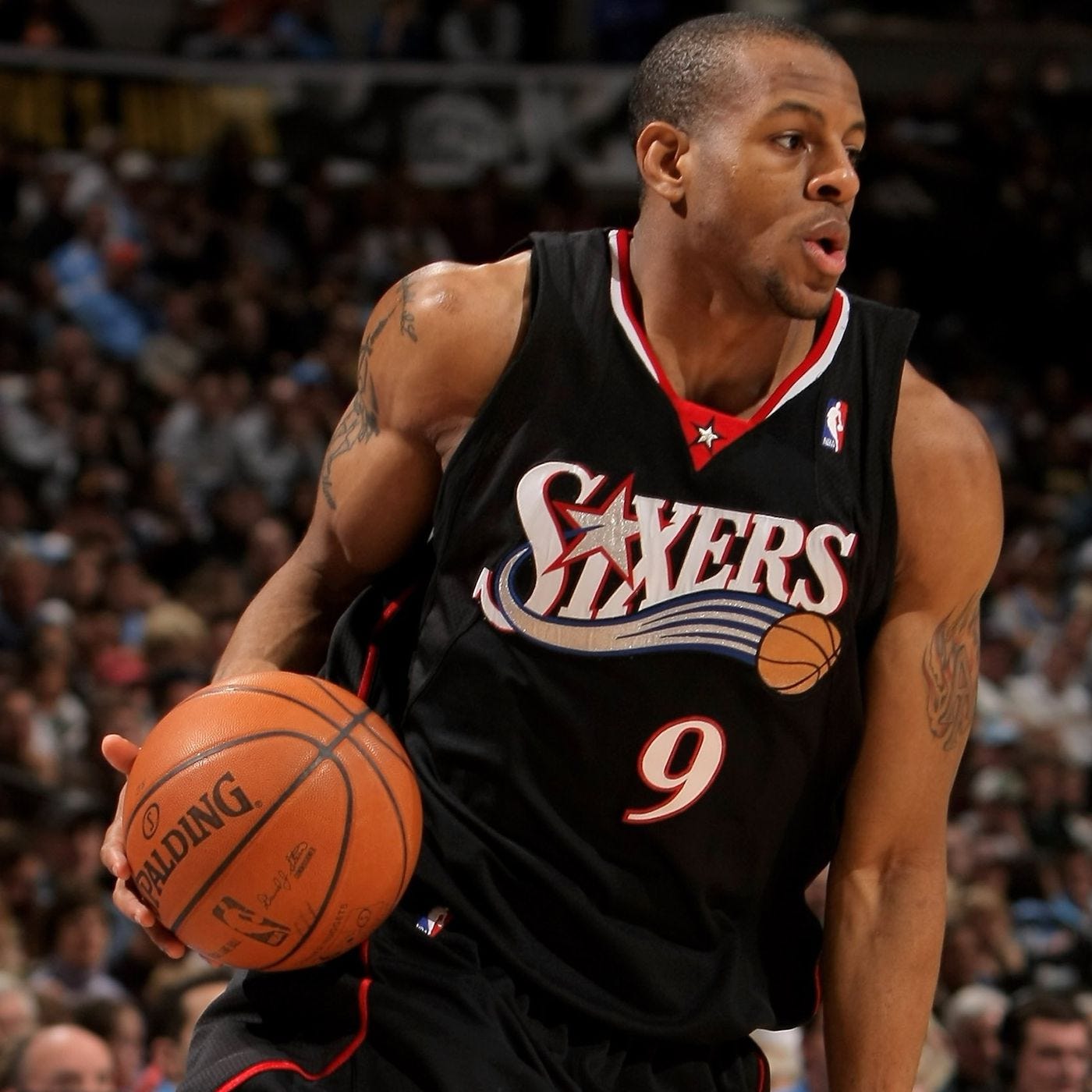Josh “Starks” Hart The Knicks Point Forward
Josh Hart has developed himself into an elite point forward, so to show support for Josh wanted to write about his current remarkable season and some of the best Point Forwards in NBA history.
Nicknames often carry a story, and “Josh Starks Hart” is no exception. Coined by a seasoned Knick fan, my co worker Jermaine the OG, this moniker reflects not just a touch of nostalgia for the great John Starks but also a recognition of the grit, heart, and playmaking that Josh Hart brings to the New York Knicks. Like Starks, Hart is a relentless competitor who thrives in high-pressure moments, but his game also features a modern twist: his ability to seamlessly combine rebounding, scoring, and playmaking from the forward position. This season, Hart has taken the point forward role to new heights, putting up historic numbers while impacting the game in every facet. From setting Knicks franchise records to leading the league in rebounds by a guard, Josh Hart has become an essential part of the Knicks’ success—and a player who bridges eras with his throwback mentality and cutting-edge versatility. So this article I wanted to dedicate it to Josh Hart and make sure my disrespect is loud as my respect.
The NBA has long been a league of innovation, and the concept of the “point forward” stands as one of basketball’s most fascinating evolutions. A role traditionally reserved for guards, playmaking from the forward position has reshaped offensive schemes and created matchup nightmares for decades. Today, Josh Hart of the New York Knicks is the latest in a lineage of players redefining the role. I never knew Josh Hart to be a great passer, even at Villanova I didn’t see the passing instincts. Once he became a Knick, I noticed it about 3 months in a Knick jersey.
Hart’s 2024-25 season has been nothing short of remarkable. He’s on pace to be the only player 6’8” or shorter in NBA history to average at least 14 points, 9 rebounds, 5 assists, 1 steal, and shoot 55% from the field. Hart has been dominant in multiple areas, and his versatility was on full display in a game against the Philadelphia 76ers. In that matchup, he became the first Knick ever to record 17 rebounds, 12 assists, and 4 steals in a single contest—a feat matched by only four players in NBA history: Russell Westbrook, Nikola Jokic, Fat Lever, and Draymond Green.
Beyond his individual brilliance, Hart’s impact on his team is undeniable. His presence has elevated teammate Deuce McBride’s three-point shooting efficiency. McBride shoots an impressive 41.3% from beyond the arc when sharing the court with Hart, compared to just 33.9% without him. Hart’s ability to rebound, push the ball in transition, and find open shooters has made him a catalyst for the Knicks’ offense.
Statistically, Hart has been a force across the board. He leads all guards in rebounds, ranks second in double-doubles, and is fourth in both triple-doubles and combined rebounds plus assists. Since January 1st, Hart has led all NBA players in total rebounds, a staggering achievement for a player his size. Over his last 13 games, he has averaged 14.8 points, 12.9 rebounds, and 6.2 assists, recording double-doubles in 12 of those contests. Hart’s consistency and impact draw comparisons to some of the greatest point forwards in NBA history. Every other game I find myself thinking about past NBA players I watched and former NBA players before my time who fits the definition of “Point-Forward”.
Paul Pressey: The Pioneer
Paul Pressey is widely credited as the first true point forward in NBA history. A 6’5” forward for the Milwaukee Bucks in the 1980s, Pressey was ahead of his time. Under the innovative coaching of Don Nelson, Pressey was tasked with initiating the offense, a role typically reserved for point guards. His combination of ball-handling, court vision, and defensive prowess set the blueprint for future point forwards.
During his prime, Pressey was a nightly triple-double threat. In the 1984-85 season, he averaged 16.1 points, 5.4 rebounds, and 6.8 assists, showcasing his ability to impact all facets of the game. His career-high 16 assists were a testament to his playmaking ability, and he finished his career with over 3,000 assists despite playing in an era dominated by traditional positions. Pressey was also a defensive stalwart, earning three All-Defensive Team selections.
Larry Bird: A Basketball Genius
Larry Bird, the Boston Celtics icon, was not just one of the best scorers in NBA history but also one of its most intelligent playmakers. At 6’9”, Bird possessed an uncanny ability to see plays develop before they happened. His passing was precise, his vision unmatched, and his ability to read defenses unparalleled.
Bird’s numbers reflect his versatility. Over his career, he averaged 24.3 points, 10.0 rebounds, and 6.3 assists per game. In a 1987 game against the Washington Bullets, Bird recorded a career-high 17 assists, proving that he could dominate as a playmaker when needed. His passing was a key reason why the Celtics won three championships in the 1980s. Beyond his numbers, Bird’s leadership and unselfish play made him one of the most respected figures in the game.
Scottie Pippen: The Perfect Complement
Scottie Pippen’s role as a point forward was essential to the Chicago Bulls’ six championship runs in the 1990s. While Michael Jordan was the team’s primary scorer, Pippen often acted as the facilitator, initiating the offense and creating opportunities for his teammates. At 6’8”, Pippen’s length, athleticism, and basketball IQ made him a nightmare for defenders.
Pippen’s career averages of 16.1 points, 6.4 rebounds, and 5.2 assists only scratch the surface of his impact. In 1991, Pippen recorded a career-high 15 assists in a game, showcasing his ability to dominate as a playmaker. He finished his career with over 6,000 assists and earned eight All-Defensive First Team selections. Pippen’s defensive versatility and offensive creativity made him the ultimate two-way player.
Grant Hill: A Superstar in His Prime
Grant Hill’s early years with the Detroit Pistons were nothing short of spectacular. Dubbed the heir apparent to Michael Jordan, Hill brought a unique blend of athleticism, skill, and poise. At 6’8”, Hill excelled as a scorer, rebounder, and playmaker, redefining what a forward could do on the court.
In the 1996-97 season, Hill averaged 21.4 points, 9.0 rebounds, and 7.3 assists, becoming the first forward since Larry Bird to rank in the top 10 in assists. Hill’s career-high 14 assists demonstrated his ability to control a game as a distributor.
Though injuries derailed his prime, Hill still made seven All-Star appearances and was inducted into the Hall of Fame, cementing his legacy as one of the greats.
LeBron James: The Ultimate Point Forward
LeBron James is the pinnacle of the point forward archetype. Standing 6’9” and weighing 250 pounds, James combines size, speed, and basketball IQ like no other player in history.
From the moment he entered the NBA in 2003, James has been the primary playmaker for every team he’s played on, redefining what a modern forward can accomplish. I watched Lebron James get drafted at 13 years old on the fat black tv, black cable box with the red letters.
His career averages of 27.2 points, 7.5 rebounds, and 7.3 assists are unparalleled. In 2020, LeBron led the NBA in assists, averaging 10.2 per game—a rare feat for a forward. His career-high 19 assists highlight his ability to control the game. With four NBA championships, four MVPs, and countless All-NBA selections, LeBron has elevated the point forward position to heights no one could have imagined.
Lamar Odom: The Do-It-All Forward
Lamar “The Goodz” Odom’s unique skill set made him one of the most versatile players of his generation. At 6’10”, Odom possessed the ball-handling and court vision of a guard, allowing him to operate as a point forward throughout his career. His ability to facilitate while still being a strong scorer and rebounder made him a critical piece for the Los Angeles Lakers during their championship runs in 2009 and 2010.
In the 2003-04 season with the Miami Heat, Odom averaged 17.1 points, 9.7 rebounds, and 4.1 assists, showcasing his versatility. His career-high 14 assists came in a 2006 game with the Lakers, highlighting his playmaking ability.
Odom was named NBA Sixth Man of the Year in 2011, a testament to his willingness to adapt to any role for team success. His career averages of 13.3 points, 8.4 rebounds, and 3.7 assists speak to his all-around impact, while his unselfish play and basketball IQ made him a prototype for modern position-less basketball.
Hedo Turkoglu: The Stretch Playmaker
Hedo Turkoglu was one of the first players to combine the point forward role with the ability to stretch the floor as a three-point shooter. At 6’10”, Turkoglu thrived as a playmaker for the Orlando Magic, particularly during their run to the NBA Finals in 2009. His ability to operate in the pick-and-roll, find open teammates, and knock down outside shots made him a nightmare matchup for opposing defenses.
Turk best season came in 2007-08 when he averaged 19.5 points, 5.7 rebounds, and 5.0 assists, earning the NBA’s Most Improved Player award. He recorded a career-high 13 assists in a game during the 2004-05 season, proving his playmaking capabilities. Over his career, Turkoglu hit more than 1,200 three-pointers and finished with averages of 11.1 points, 4.0 rebounds, and 3.0 assists. His unique blend of shooting and passing redefined what teams could expect from a forward in a playmaking role.
Boris Diaw: The Swiss Army Knife
Boris Diaw was the epitome of a Swiss Army knife on the basketball court. Whether as a starter or coming off the bench, Diaw excelled in every aspect of the game—scoring, rebounding, passing, and defending multiple positions. At 6’8”, he had the size to battle in the post and the finesse to operate as a primary playmaker.
Diaw’s most impactful stretch came during his time with the Phoenix Suns and later the San Antonio Spurs. In the 2005-06 season, Diaw averaged 13.3 points, 6.9 rebounds, and 6.2 assists with Phoenix, earning the NBA’s Most Improved Player award. His career-high 16 assists came in a game with the Charlotte Bobcats, further demonstrating his vision and creativity. Diaw was a key contributor to the Spurs’ 2014 championship run, where his passing and versatility unlocked their ball-movement-heavy offense. His career totals of 4,000+ assists and 4,500+ rebounds solidify his status as one of the most impactful point forwards of his era.
Anthony Mason: The Enforcer with Vision
Anthony Mason brought a rare combination of physicality and finesse to the point forward role. Known for his toughness and strength, Mason also possessed exceptional court vision and passing ability, which he used to facilitate offenses during his time with the Knicks, Hornets, and Heat.
In the 1996-97 season with the Charlotte Hornets, Mason averaged 16.2 points, 11.4 rebounds, and 5.7 assists, leading the team in multiple categories. He recorded a career-high 13 assists during that campaign, showcasing his ability to orchestrate the offense. Mason was named an All-Star in 2001 and earned All-NBA Third Team honors in 1997. His unique skill set made him a valuable player in any system, and his contributions paved the way for future physical point forwards like Draymond Green.
Draymond Green: The Defensive Maestro
Draymond Green has redefined the point forward role in the modern era. As the emotional and tactical leader of the Golden State Warriors, Green’s ability to facilitate offense and anchor the defense has been instrumental in their four championships. At 6’6”, Green’s size and skill set allow him to guard all five positions while serving as the primary playmaker in the Warriors’ motion offense.
In the 2015-16 season, Green averaged a career-high 7.4 assists per game and recorded a career-high 19 assists in a game against Denver. His career averages of 8.7 points, 7.0 rebounds, and 5.6 assists don’t fully capture his impact, as Green consistently ranks among the league leaders in advanced metrics like defensive win shares. A three-time All-Star, Green was named Defensive Player of the Year in 2017 and has made seven All-Defensive Teams. His ability to blend playmaking, defense, and leadership has made him one of the most unique and valuable point forwards in NBA history.
Andre Iguodala: The Glue Guy Extraordinaire
Andre Iguodala’s basketball IQ and unselfishness made him one of the most valuable role players in NBA history. Known for his defensive brilliance, Iguodala also excelled as a secondary playmaker, particularly during his tenure with the Golden State Warriors.
During his time in Philadelphia, Iguodala averaged over 5 assists per game for multiple seasons, including a career-high 16 assists in a game in 2009. His versatility was on full display during the Warriors’ championship runs, where he often facilitated the offense in key moments. Iguodala was named NBA Finals MVP in 2015 for his two-way dominance against LeBron James. With four championships and two All-Defensive Team selections, Iguodala’s contributions as a point forward have been both understated and invaluable.
Each of these players, from Anthony Mason’s brute strength to Boris Diaw’s finesse, has added their unique twist to the evolution of the point forward. The archetype continues to evolve, with players like Josh Hart keeping the tradition alive and proving that the role remains as impactful as ever.
Thank you for taking the time to explore this journey through the evolution of the point forward and the incredible impact Josh Hart has had on the New York Knicks. Your interest in the game and its rich history helps keep the passion for basketball alive. From the legends who paved the way to Hart’s relentless effort and versatility today, it’s fans like you who truly make the game special. Your support means the world.
Peace and blessings!


